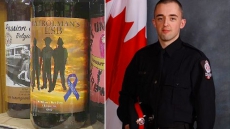VICTORIA — The waves rose out of nowhere, tipped the boats straight up and hurled people into the churning seas. There was no time for maydays.
The survivor accounts and official reports from two deadly British Columbia whale-watching tragedies 17 years apart bear eerie similarities.
Michael Harris, Pacific Whale Watch Association spokesman, said the location of last October's tragedy aboard the Leviathan II that claimed six lives and its parallels to a 1998 whale-watching voyage where two people died are bound to raise concerns for investigators.
"Some kind of sea conditions contributed," he said. "Boats like that don't just sink. You do have a congruence of location. They are going to look at that."
The latest tragedy off the west coast of Vancouver Island has the industry bracing for a flood of safety measures imposed by government, and looking inward at the experiences operators offer to tourists, said Harris.
Both incidents occurred at Plover Reefs, just west of Tofino, a remote Vancouver Island community known for endless beaches, storm watching and surfing waves.
Jamie's Whaling Station, one of many whale-watching companies in the community, was involved in both accidents with its vessels: the 20-metre Leviathan II and the six-metre Ocean Thunder.
Reports into occurrences point to huge waves ambushing the vessels.
In the latest incident, 27 people were dumped into the water. Five Britons died in the sinking: David Thomas, 50, and his 18 year-old son Stephen; Jack Slater, 76, a British national living in Toronto; Katie Taylor, a 29-year-old Briton living in Whistler, B.C., and 63-year-old Nigel Hooker of Southampton, England.
Surfers discovered the body of Australian tourist Raveshan Morgan Pillay, 27, on Vargas Island, not far from Tofino weeks after the boat capsized.
The loss of the six souls on the Leviathan II sent shock waves across the global whale-watching industry, which boasts a stellar safety record, Harris said.
"This tragedy in many, many ways has sent ripples across the whale-watch industry, globally, especially North America," said Harris in a telephone interview from Seattle.
"We're all watching this," he said. "Whenever something happens and you are so shocked that your heart just sinks you don't get over that soon.
"We don't want it to ever happen again anywhere on the planet. We really need to take care of our passengers."
His association represents 36 west-coast whale-watch operators along the Pacific Coast near Victoria and Seattle. It does not represent operators off Tofino.
His members' vessels carried about 400,000 people in 2015, made almost 14,000 voyages and earned about US$145 million. There were no reports of deaths or serious injuries, but association vessels have been involved in six rescues in the last three years of divers and others in distress.
Harris said the industry is anticipating that the Transportation Safety Board and Transport Canada will examine the structure of whale-watching vessels and their operations off B.C.'s coast.
The Leviathan II is a converted forest-industry vessel and Ocean Thunder is a rigid-hull inflatable.
Harris said he expects the probes to examine policy surrounding the use of life-jackets. Leviathan II passengers were not required to wear life-jackets, but Ocean Thunder passengers wore full life-protection suits.
Prior to the October tragedy, the TSB reported two fatal whale-watching incidents in Canada involving four deaths. It reported the 1998 Ocean Thunder incident, and in 1992, a small, open charter boat with four people on board capsized near Port Alberni, B.C., killing two.
In the Leviathan II incident, safety board investigators have said passengers were standing on one side of the top deck when a wave hit the opposite side of the vessel.

"This would have raised the centre of gravity, affecting the vessel’s stability," said investigator Marc-Andre Poisson in Tofino just days after the boat flipped. "We also know that the sea conditions were such that the wave approached the vessel from the starboard quarter. We know the vessel broached and then capsized."
Survivor Dwayne Mazereeuw of Calgary said last month that he noticed a large wave approaching from his right, but didn't think it was dangerous until people were tossed into the water.
"From what I know, and what I saw, I would say it was a large wave that broadsided us, broadsided the boat and knocked it right over," he said.
Images of the inverted bow of the Leviathan II bobbing in the ocean were transmitted worldwide.
The TSB's report into the Ocean Thunder incident described water conditions similar to those mentioned in the Leviathan's preliminary-investigation report and a survivor's account.
"The waters were turbulent and the sea and swell were confused," stated the 25-page report. "As the boat made its way through the turbulent waters near the reefs and the operator negotiated a channel between the rocks, a wave from the stern swamped the boat."
A second large wave struck the Ocean Thunder from the port side and raised the port side to a near vertical angle, stated the report.
"The suddenness of the roll to a large angle and the breaking wave caused the passengers and the operator to be thrown over the starboard side and into the sea. No mayday message was transmitted."
Ahousaht First Nation Coun. Tom Campbell, said the area around Plover Reefs has plentiful marine wildlife and is frequented by whale watchers, but the waters are not predictable. Campbell said he finds himself counting waves near the reefs because the fourth wave is often furious.
Campbell's relatives at the nearby First Nation's village of Ahousaht were instrumental is rescuing the people on board the Leviathan II.
Tofino Mayor Josie Osborne said her community is struggling to make sense with what happened on the water.
"It really is a grieving process for many people," she said. "We're all waiting for the results of the TSB to see what recommendations they might be making."



